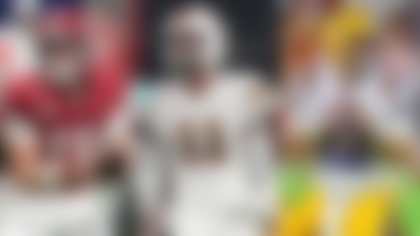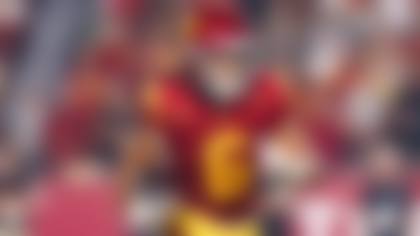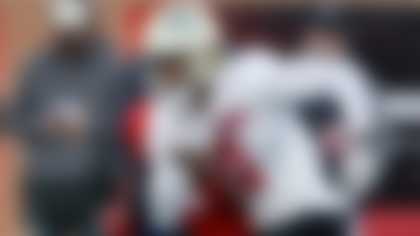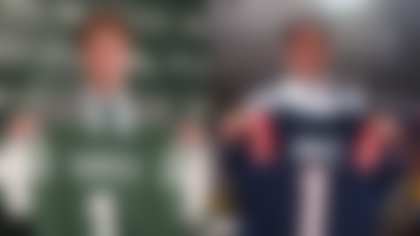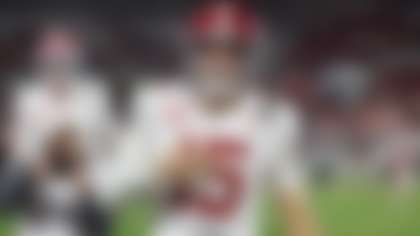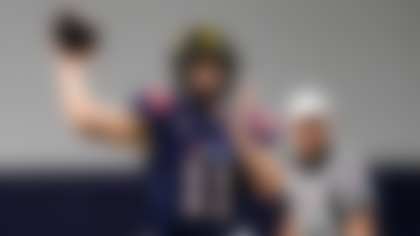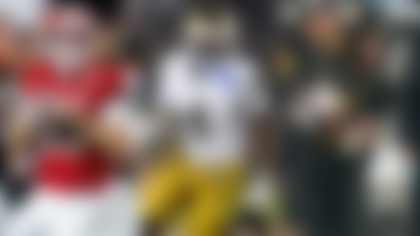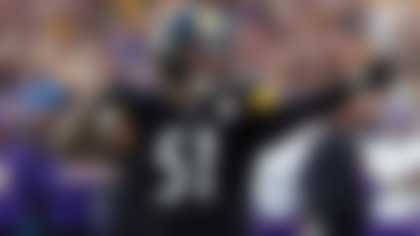Franchise quarterback is the most elusive and essential need in all of pro football. NFL teams are desperate to find one, willing to part with valuable draft capital or invest millions in the hopes of adding this critical piece to the roster. But too often in their pursuit of a top-tier passer, organizations mistake adequate for exceptional, fooling themselves into thinking a middle-of-the-road passer is worthy of being the face of the franchise.
So what is a franchise quarterback, and which teams have had the best run of them? To answer these two questions, we established four simple criteria and applied them to every quarterback since the common-era draft began in 1967, when the AFL and NFL first began drafting together. To qualify, a player must have 48 starts with one team and meet two of the following three requirements:
1) Winning regular-season record.
2) Minimum passer rating of 75.0.
3) At least one Pro Bowl selection.
None of these provisions alone paint a perfect picture, but together they help to illustrate sustained production at an above-average level. And at the core of what all fans crave from their quarterback is someone who consistently keeps the team competitive and provides a realistic shot at the playoffs. Everything else is gravy.
For every franchise passer teams get right, there are countless others they miss on entirely. That's why we've also identified each organization's biggest QB misstep. Perspective is important, and we should always remember just how bad things can get when dependable quarterback play disappears.
Because we only considered a player's performance from 1967 onward, some notable passers, such as Bart Starr and Don Meredith, aren't included, while others, like Johnny Unitas, only have post-'66 production factored into their franchise QB eligibility.
I'm sure you'll agree with all of the choices below, so I don't expect any disparaging tweets. Next up: NFC East.
NOTE: Pro Bowl totals below include AFL All-Star Game selections, while Super Bowl ring totals only include titles won as the team's starting quarterback. The names of franchise QBs who are also their team's current starter are bolded.
Dallas Cowboys
Who qualifies for the Cowboys?
-- Dak Prescott (2016-present): 48 starts | 32-16 | 2 Pro Bowls | 96.0 passer rating
-- Tony Romo (2003-2016): 127 starts | 78-49 | 4 Pro Bowls | 97.1 passer rating
-- Troy Aikman (1989-2000): 165 starts | 94-71 | 6 Pro Bowls | 81.6 passer rating | 3 SB rings
-- Danny White (1976-1988): 92 starts | 62-30 | 1 Pro Bowl | 81.7 passer rating
-- Roger Staubach (1969-1979): 114 starts | 85-29 | 6 Pro Bowls | 83.4 passer rating | 2 SB rings
THE Franchise QB: Roger Staubach
There's definitely a case for Aikman, but Staubach and his '70s Cowboys were just so damn efficient. Staubach won 85 starts for the Cowboys compared with 94 for Aikman, and they have comparable touchdown totals, fourth-quarter comebacks and game-winning drives, but Staubach started 51 fewer games. He had a .746 winning percentage! While Aikman's three Super Bowl wins to Staubach's two might tilt the scales in No. 8's favor, Staubach's total of six conference championship appearances to Aikman's four quiets that argument some. It's close, but I'm going with the guy who led the NFL in passer rating four times.
Biggest QB misstep: The 2001 group
Fresh off Aikman's retirement and five years before Tony Romo became the face of the franchise, the 2001 Cowboys trotted out Quincy Carter (3-5), Anthony Wright (1-2), Ryan Leaf (0-3) and Clint Stoerner (1-1). No surprise the Cowboys ranked dead last in passing that season. Somehow, Emmitt Smith still rushed for more than 1,000 yards (in just 14 games). But it would be the last time he'd do so in his NFL career. I'm not saying this group of QBs is the reason for Smith's statistical decline, but I'm also not not saying that.
I know some Cowboys fans might argue using a first-rounder on quarterback Steve Walsh (supplemental draft) the same year the team took Aikman first overall in the 1989 NFL Draft is a bigger head-scratcher, but then I'd be forced to point to the three Lombardi Trophies that arrived in Dallas within the next seven years despite that decision. And then I'd realize I'd played right into those fans' hands ...
Longest QB drought: 2001-2005
The Cowboys have had an embarrassment of riches at the quarterback position over the last 50-plus years. But as mentioned above, Dallas descended into QB despair in the early 2000s, forced to start the likes of Leaf, Chad Hutchinson, Drew Henson, Drew Bledsoe and a 41-year-old Vinny Testaverde before Romo, who signed as an undrafted free agent in 2003, ascended to the top job in '06. Romo, oft-underappreciated during his decade-long run as a top-10 NFL quarterback, might end up being known more for his post-career broadcasting prowess than his stellar on-field performances. That would be a shame. The Romo-to-Prescott transition certainly had its awkward moments, but Dallas escaped any sort of "gap" year in the transfer of franchise power. Through three NFL seasons, Prescott has already attained franchise QB status. Now, the question is whether he'll be paid accordingly.
New York Giants
Who qualifies for the Giants?
-- Eli Manning (2004-present): 230 starts | 116-114 | 4 Pro Bowls | 84.1 passer rating | 2 SB rings
-- Kerry Collins (1999-2003): 68 starts | 35-33 | 0 Pro Bowls | 78.4 passer rating
-- Phil Simms (1979-1993): 159 starts | 95-64 | 2 Pro Bowls | 78.5 passer rating | 1 SB ring
-- Fran Tarkenton (1967-1971): 69 starts | 33-36 | 4 Pro Bowls | 81.0 passer rating
THE Franchise QB: Eli Manning
Say what you want about the youngest Manning brother, but he has two rings and every Giants passing record worth having. He's certainly had his share of low moments during the past 15 seasons (seeing his streak of consecutive games started snapped because of a needless benching comes to mind), but he's also authored two of themost iconic plays in NFL history. And during both of the Giants' Super Bowl runs this millennium, he threw a combined 15 touchdown passes against just two interceptions, completing more than 60 percent of his passes along the way. The only true foil for the GOAT, Manning solidified his Giants legacy years ago. Even another lackluster season won't hurt his standing.
Biggest QB misstep: Dave Brown
The Giants have drafted just four quarterbacks in the first round since 1967, and two of them went to Duke. Dave Brown, whom the Giants took No. 1 overall in the 1992 supplemental draft (thereby forfeiting their '93 first-rounder), was brought in to succeed an aging, Super Bowl-winning franchise QB. Sound familiar? That's where the fans of Big Blue will hope the similarities end between Dave Brown and Daniel Jones. Brown, who sat behind Simms for two seasons, finally got his chance in '94 and was ... fine. He started every game but one from '94 to '96 but progressively got worse. His Giants career hit rock bottom in '97, when he was sidelined due to a chest injury and couldn't reclaim the starting job from Danny Kanell. Good luck, Daniel Jones!
Longest QB drought: 1972-78
After trading Tarkenton back to the Vikings (a strong candidate for biggest misstep), the Giants entered a deep, dark quarterback abyss. Guys like Jerry Golsteyn, Randy Dean and Joe Pisarcik are great reminders to appreciate every minute of Eli Manning's NFL career.
Philadelphia Eagles
THE Franchise QB: Donovan McNabb
McNabb came under fire recently by both fans and Eagles players for comments he made pertaining to Philly's current QB1 (and potential franchise candidate) Carson Wentz. But put that aside -- as well as the other gripesEagles fans have had with the quarterback -- and focus solely on his on-field achievements, and he becomes the obvious choice. He completely lived up to his draft status (second overall in 1999), guiding the Eagles to five conference championship games and one Super Bowl in 11 seasons as the team's starter. That Eagles' decision-makers were willing to trade him within the division late in his career is certainly an indelible stain on his resume. But Philly's NFC dominance under McNabb's direction simply counts for too much.
Biggest QB misstep: John Reaves
Despite finishing his Florida career as the NCAA's all-time passing leader, Reaves -- the Eagles' first first-round QB of the common-draft era -- couldn't translate his Saturday success into Sunday stardom. The 14th overall pick in the 1972 draft started just seven games (losing all of them) in three years for the Eagles and dealt with substance abuse problems for much of his career. Philadelphia traded the struggling passer to the Bengals in '75 and endured back-to-back four-win seasons before Jaworski was acquired and revitalized the franchise.
Longest QB drought: 2010-present
Technically the team's drought from '67 to Jaworski is one year longer than post-McNabb to today, but I find the past 10 years much more interesting, so I'm going to focus my energy there. (Hurray, recency bias!) The Eagles have been one of the most winning teams in the past 30 years, making 17 postseason appearances during that span, thanks in large part to McNabb and Cunningham. However, it was non-franchise QB Nick Foles who brought home the organization's first Lombardi Trophy. So who needs a franchise passer anyway, am I right? The jury is still out on current starter Carson Wentz, who has shown enough in his first 40 games to be a mainstay at Lincoln Financial Field for a long time -- if he can stay healthy. (Provided he starts at least eight more games and wins at least two, he'll meet the criteria for this piece.) At the very least, Philly fans should be grateful that Wentz enters 2019 as the team's starting QB, and not Kevin Kolb, Vince Young or Mark Sanchez, who combined to throw 31 picks in 18 Eagles starts this decade.
Washington Redskins
Who qualifies for the Redskins?
-- Kirk Cousins (2012-17): 57 starts | 26-30-1 | 1 Pro Bowl | 93.7 passer rating
-- Mark Rypien (1988-1993): 72 starts | 45-27 | 2 Pro Bowls | 80.2 passer rating | 1 SB ring
-- Joe Theismann (1974-1985): 124 starts | 77-47 | 2 Pro Bowls | 77.4 passer rating | 1 MVP | 1 SB ring
-- Billy Kilmer (1971-78): 74 starts | 50-23-1 | 1 Pro Bowl | 76.9 passer rating
-- Sonny Jurgensen (1967-1974): 67 starts | 33-29-5 | 2 Pro Bowls | 86.0 passer rating
THE Franchise QB: Joe Theismann
Washington's win total and its overall quarterback play since 1967 align quite nicely: They're an above-average team (12th most wins during that period) that has received above-average quarterback play. Theismann best encapsulates this truth, posting a .619 winning percentage from 1978 to 1985 (when he served as the team's full-time starter). Among QBs who started at least 32 games in that eight-year window, the former fourth-rounder recorded the third-most passing touchdowns and yards, but ranked 11th in passer rating and completion percentage and had the 20th best yards per attempt. Fantastic in a few areas, really good in others and just OK in some.
Biggest QB misstep: Heath Shuler
Shuler was drafted third overall in '94 to carry the torch from his Super Bowl-winning predecessors. Instead, the young QB fumbled the exchange, setting the organization ablaze. Shuler started eight games his rookie year, going 1-7 with a 59.6 passer rating. Two years and just five starts later, Shuler had been relegated to the bench for Gus Frerotte, who was drafted 194 picks after Shuler. A supposed face of the franchise was supplanted by a late-round pick from the same draft class -- feels like we've seen something similar before. Like Robert Griffin III, Shuler also suffered a serious lower-body injury fairly early in his pro career. Unlike RGIII, Shuler did not win Offensive Rookie of the Year, make a playoff appearance or earn a Pro Bowl nod.
Longest QB drought: 1994-2011
Washington certainly had glimpses of fine, if not solid, quarterback performances during this 18-season spell. Mark Brunell and Brad Johnson both played well enough during their short stints with the franchise to help Washington make the playoffs. But the organization missed on two first-rounders, Patrick Ramsey in 2002 and Jason Campbell in 2005, and resorted to starting Tony Banks, Danny Wuerffel and shell-of-himself Donovan McNabb in an effort to stay afloat before RGIII/Kirk Cousins arrived. Will 2019 15th overall pick Dwayne Haskins be the first Redskins QB to live up to his high draft pedigree?
Follow Ali Bhanpuri on Twitter @AliBhanpuri.


